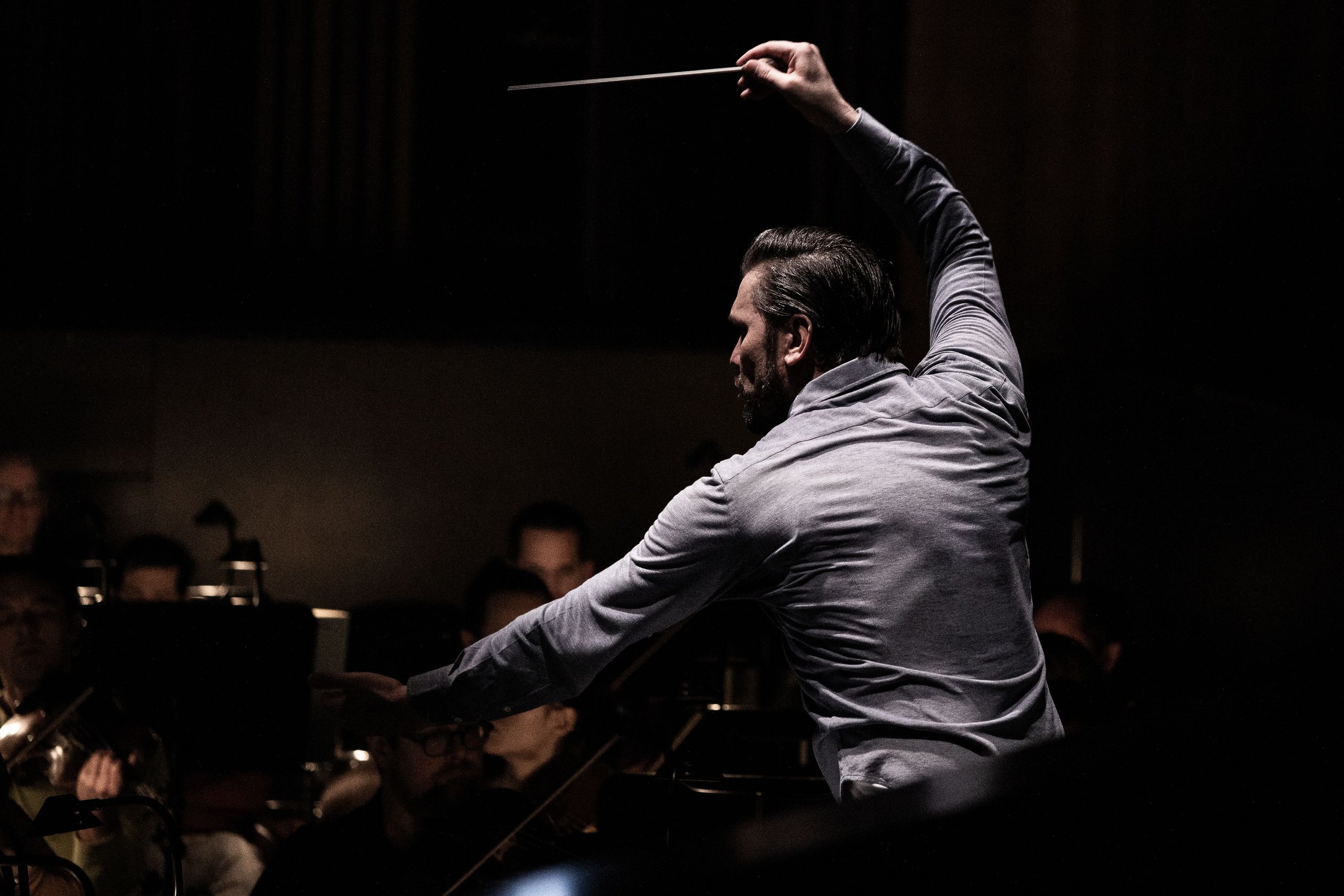VITA
Enrico Calesso, born in Treviso, is the Designated Stable Music Director of the Giuseppe Verdi Opera Theater in Trieste and Stable Guest Conductor at the Landestheater in Linz, Austria. The experienced conductor is as comfortable on the concert podium as he is on the opera stage and, thanks to his vast repertoire, is known for his competent and insightful interpretations. His philosophical background and clear interpretive ideas make Enrico Calesso one of the most interesting musical figures of our time.
Enrico Calesso has conducted orchestras such as the Gewandhaus Orchester in Leipzig, the Orchestra del Maggio Musicale Fiorentino, the Orchestra del Teatro La Fenice, the Orchestra del Teatro Verdi in Trieste, the Orchestra del Teatro Lirico in Cagliari, the Wiener Symphoniker, the Bruckner Orchester Linz, the Orchestra della Svizzera Italiana, the Austrian Radio Orchestra in Vienna, the Orchestra del Puccini Festival in Torre del Lago, the Haydn Orchestra of Bolzano and Trento, the Berner Symphonie-Orchester, the Neue Philharmonie Westfalen, the Tiroler Symphonieorchester of Innsbruck, the Mantua Chamber Orchestra, the Münchner Symphoniker, the Staatskapelle Schwerin, the Norddeutsche Philharmonie, the Jenaer Philharmonie, the Nordwestdeutsche Philharmonie, the Erfurt Philharmonic Orchestra, the Orchestre Symphonique de Mulhouse, and the Rzeszow Symphony Orchestra.
"Italian Enrico Calesso on the podium not only energetically draws out the dramatic nature of the score, without the music ever losing transparency, but also delves into the feelings of the protagonists with great flexibility."
- Frankfurter Allgemeine Zeitung
After debuting in 2016 for the Gran Teatro La Fenice in Venice with the diptych Il segreto di Susanna / Agenzia Matrimoniale, he returned there in 2017 and 2018 for two revivals of La Traviata, in 2019 with the concertation of Pinocchio (P. Valtinoni) and in February 2022 with the concertation of the world premiere of Le Baruffe (G. Battistelli). With La Traviata he debuted with great success in 2018 at the Teatro del Maggio Musicale Fiorentino and in 2019 at the Leipzig Opera, where he returned for the same title in the 2021/22 season. After his excellent concerts of Don Giovanni (2017) and Il Trovatore (2020), he was appointed permanent guest conductor at the Landestheater Linz until 2029, concerting I Capuleti e i Montecchi (2020), Aida (2022), La Forza del Destino, and the veristic diptych Cavalleria Rusticana/Pagliacci (2023). After achieving great public and critical success with her debut at the Torre del Lago Puccini Festival (Madama Butterfly, 2020), confirmed in 2021 with La Bohème, she returned there in 2022 for the concertation of Tosca.
With Götterdämmerung he opened the first tetralogy of Wagner's Der Ring des Nibelungen in the history of the Mainfranken Theater in Würzburg in 2019. For his concertation, he was nominated for conductor of the year in the prestigious Jahrbuch 2019 of "Opernwelt" magazine. In the same magazine's Jahrbuch 2020, he was again nominated in the performance of the year category for his highly acclaimed concertation of Rigoletto in Würzburg. For the G. Verdi opera house in Trieste, he has concerted I Capuleti e i Montecchi, Ariadne auf Naxos, La Cenerentola, Turandot, La Traviata, and Der fliegende Holländer as of February 2023.
His opera productions in recent years also include such titles as Tristan und Isolde, Lohengrin, Salome, Der fliegende Holländer, Ariadne auf Naxos, Elektra, Wozzeck, The Makropulos Affair, Die glückliche Hand, The Rake's Progress, Madama Butterfly, La Bohéme, Tosca, Turandot, Gianni Schicchi, Carmen, Lucia di Lammermoor, Otello, Falstaff, Aida, Macbeth, La traviata, Rigoletto, Il Trovatore, La Forza del Destino, La sonnambula, I Capuleti e i Montecchi, Medea, L'Africaine, Les Huguenots, Les Vêpres siciliennes, Eugen Onegin, Nixon in China as well as continuous research in the Mozart and Rossini areas with several productions of Le nozze di Figaro, Don Giovanni, Così fan tutte, Entführung aus dem Serail, Idomeneo, Die Zauberflöte, Italiana in Algeri, La Cenerentola, Il Barbiere di Siviglia, Guillaume Tell, and intense activity in the Baroque sphere, with rediscoveries such as Galuppi's Alessandro nell'Indie and Cherubini's Iphigenia in Aulis and important titles such as Händel's Rinaldo and Gluck's Orfeo.
In the symphonic field, the complete cycles of all Brahms Symphonies and Concertos, all Beethoven Symphonies and the most important Symphonies of Bruckner and Mahler stand out. In recent years he has intensified the study and performance of R. Strauss's compositions, especially the most significant symphonic poems, horn and oboe concertos, Metamorphosen and Bürger als Edelmann.
Enrico Calesso studied in Vienna in the class of Uroš Lajovic at the University of Music, graduating with highest honors, as well as being awarded the Würdigungspreis of the University of Vienna. Previously, he graduated in piano from the Conservatorio "Benedetto Marcello" in Venice under the guidance of Anna Colonna Romano, and received a degree in Theoretical Philosophy with highest honors from Ca' Foscari University with Prof. Emanuele Severino.


